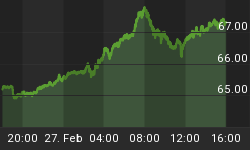One of America's largest companies is taking a controversial stance on employee benefits.
In a move that is sure to draw criticism from the mainstream press, Jonathan Johnson, chairman of online retail giant Overstock.com (OSTK), publicly stated that the company has stockpiled gold and food in preparation of a U.S. financial crisis.
Johnson recently told an audience at the United Precious Metals Association:
We are not big fans of Wall Street and we don't trust them. We foresaw the financial crisis, we fought against the financial crisis that happened in 2008; we don't trust the banks still and we foresee that with QE3, and QE4 and QE n that at some point there is going to be another significant financial crisis.
Quantitative easing (QE) is when a central bank creates money from nothing and injects it into the financial system. It's basically another word for money printing.
Johnson went on to explain the company's preparations.
So what do we do as a business so that we would be prepared when that happens? One thing that we do that is fairly unique: we have about $10 million in gold, mostly the small button-sized coins, that we keep outside of the banking system. We expect that when there is a financial crisis there will be a banking holiday. I don't know if it will be two days, or two weeks, or two months. We have $10 million in gold and silver in denominations small enough that we can use for payroll. We want to be able to keep our employees paid, safe, and our site up and running during a financial crisis.
We also happen to have three months of food supply for every employee that we can live on.
Taking preventive steps to keep family and friends safe in a financial crisis is common sense to many people. But to the limousine liberals in mainstream press who tow the line for big banks and the government, this type of preparation is only for "weirdos" and "conspiracy theorists."
• Longtime Casey Research readers are familiar with our stance on financial crisis preparation.
Just like it makes sense to wear a seatbelt...just like it makes sense to buy home insurance...it makes a lot of sense to stay prepared and own insurance against a major financial catastrophe.
Right now, this kind of preparation has never been more important. In other words, we think Overstock's moves represent sound thinking.
In an unprecedented monetary experiment, global central banks have kept interest rates at near-zero levels and printed trillions of new currency units since the 2008 financial crisis. All this "easy money" has warped the global economy and led to trillions of dollars in malinvestment.
We can't say when this will end, but we can say with certainty that it will end badly. For the sake of your family and friends, we hope you're taking some simple steps to prepare.
• Owning gold is the single most important step you can take to protect your money from the next financial crisis...
While governments and central bankers can destroy the value of paper currencies, they can't hurt the value of gold. Gold has held its value through every financial crisis in history. That's why humans have been using gold as a store of value for thousands of years.
We also recommend keeping plenty of cash on hand. Unlike gold, cash will likely lose at least some value during a crisis. But when a crisis hits, you may need cash to pay for everyday goods and services.
Keep enough cash on hand to last you and your family three to six months. Remember, it can be difficult to get cash during a crisis, as we saw in Greece this summer...
During the Greek financial crisis, the Greek government declared a "bank holiday." The government closed all the banks in the country to prevent everyone from pulling their money out and crashing the banking system.
Even after the banks reopened, the Greek government set strict daily limits on how much money people could withdraw from ATMs. For weeks, Greek people could only withdraw €60 ($67) of their own money per day from ATMs.
• We also recommend opening a foreign bank account...
Putting money in a foreign bank account is a smart way to move some of your money outside your home country. If your home country has a bank freeze, you'll still be able to access your cash that's held in a foreign bank account.
If you're not sure how to get started, we recommend reading Going Global 2015. This hardcover book explains in detail everything you need to know in order to open a foreign bank account. It includes details on the one country that has never had a bank failure, where it's easy for Americans to open a bank account. Going Global 2015 will even tell you about a bank in this country where you can open an account starting with just $400 (on page 120).
And that's just one chapter. As Casey Research's "financial survival guide," Going Global 2015 will walk you through all the best ways to protect your money.
Thousands of people have paid $99 for this book. Right now, we're giving it away for just a $4.95 processing fee. Click here to claim your copy.















